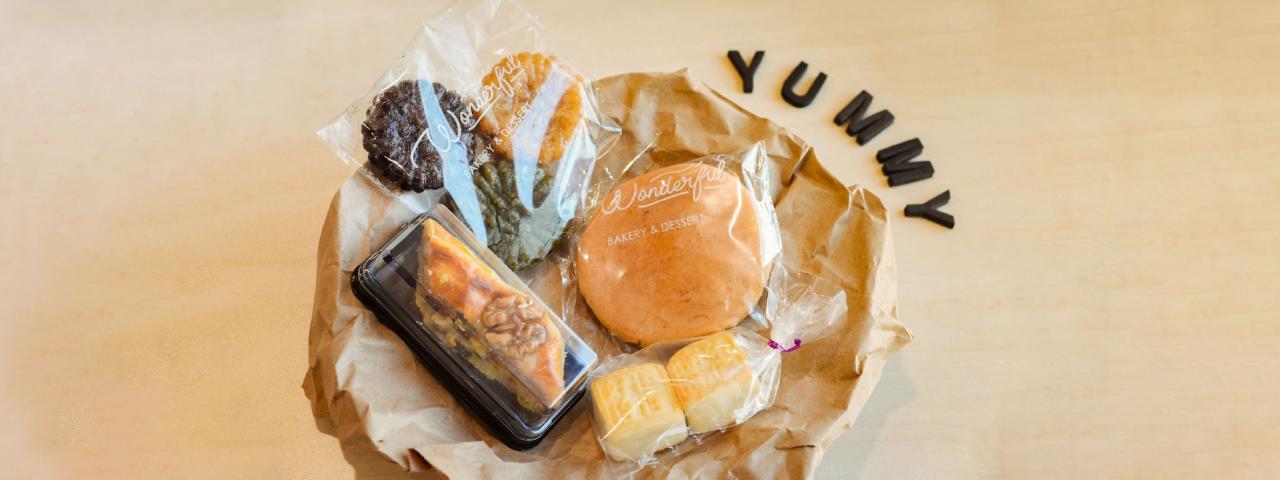
Desserts mark celebrations of all kinds—from birthdays to weddings to cultural festivities, they evoke nostalgia, comfort, and remind us of family and loved ones. Sharing them with friends also makes language learning and cultural exchange both memorable and delicious.
From October 28 to November 8, the World Languages and Chinese Language Program collaborated to host the NYU Shanghai’s first International Dessert Festival, bringing six different sweets to the cafeteria to represent the languages taught at NYU Shanghai. Over two weeks, community members sampled French caneles, Japanese dorayaki, Chinese jujube walnut pastries, leche flan from Spain, Korean yakgua, and baklava, a favorite across Middle Eastern and Mediterranean cultures.
The festival allowed students to participate in dessert-making workshops taught by language faculty, a casual way to learn about the World Languages Program and the different languages offered at NYU Shanghai.
“The preparation and sharing of desserts often become enjoyable activities that bring friends and family closer, as recipes get passed down through generations,” said Senior Chinese Language Lecturer Ku Xia, adding that students, whether or not they had previously taken language courses on campus, were welcome to join the activities.
Korean Language Lecturer Ji Young Chung said the festival was a way to help students bond. “Food is a powerful way to connect people, and desserts, in particular hold special significance in many cultures as well as in people’s day-to-day lives,” she said.
At the dessert workshop, Chung guided students through the process of making dalgona, a street food snack that gained international fame through the popular Korean drama Squid Game. “For many Koreans, making dalgona is nostalgic, recalling childhood memories of carefully carving out shapes using a needle,” Chung said, explaining that in the past, the simple treat of sugar and baking soda was usually sold by vendors near elementary schools, especially in wintertime. “If kids managed to carve out a shape successfully, they’d receive another dalgona for free,” she said. “Even though it was a small achievement, it brought a lot of joy.”
In the same room, Chinese Language Lecturers Zhao Chenchen and Gu Xiaoya showed how to make snow skin mooncakes, an iconic Mid-Autumn Festival dessert that symbolizes family reunions across China. “Sharing mooncakes and admiring the full moon with loved ones has long been a cherished tradition of the holiday,” said Zhao, adding that because they are simple to make, snow skin mooncakes are the ideal DIY activity for family bonding in the kitchen.
“I always love food programs because they speak to the heart,” said Thomas Van Cleuvenbergen ’28, a French-Moroccan student from Belgium who made his first ever red bean mooncake at the workshop. “It came out very well and was also very delicious. I was very happy,” he said.
When asked about one dessert he holds dear, he mentioned cornes de gazelle, a horn-shaped sweet which he described as a “very pleasant after-tea dessert” that is often enjoyed communally in Morocco with one person baking for several families. “There’s a lot of trust in these communities and in the end, many of the families just eat together anyway,” he said.
Aazam Razaali ’27, who calls both Paris, France and Antananarivo, Madagascar home says it’s hard to choose a favorite but that his top three desserts include French crème brûlée, Malagasy mofo gasy, and the strawberry crumble his mother usually makes for birthdays or for entertaining guests. “It’s a dessert my mom used to make when I was growing up in Madagascar—a place she was not familiar with because she grew up in Toronto,” Razaali said. “I think it had an important significance for the both of us because it reminded her of her childhood, and it was such an integral part of mine.”
Lylian Li ’27 from Guangzhou said her favorite dessert, shuang pi nai or “double skin milk,” (a specialty from her hometown made of milk, egg whites, and sugar), was a reward for hard work.
“Before evening study sessions, I would order shuang pi nai through delivery and save it,” she said. “I especially enjoyed savoring a spoonful after finishing an answer—when the soft milk melted in my mouth, it made the bitter senior life sweeter.”
Boost your language learning skills by joining one of the upcoming “Conversation Nights” this month:
- November 12, 5:15 PM - 6:15 PM, Chinese Conversation Night Special Event: CLP & GCS Game Night
- November 14, 6:15 PM - 7:15 PM, Urdu and Hindi Conversation Night
- November 19, 5:30 PM - 6:30 PM, Japanese Conversation Night
- November 20, 5:00 PM - 6:00 PM, Picoteo Latino
- November 20, 5:00 PM - 6:00 PM, Chinese Conversation Night
- November 22, 5:00 PM - 6:00 PM, Russian Conversation Night
- November 25, 5:00 PM - 6:00 PM, French Apéro Hour
- November 26, 5:00 PM - 6:00 PM, Arabic Conversation Night

